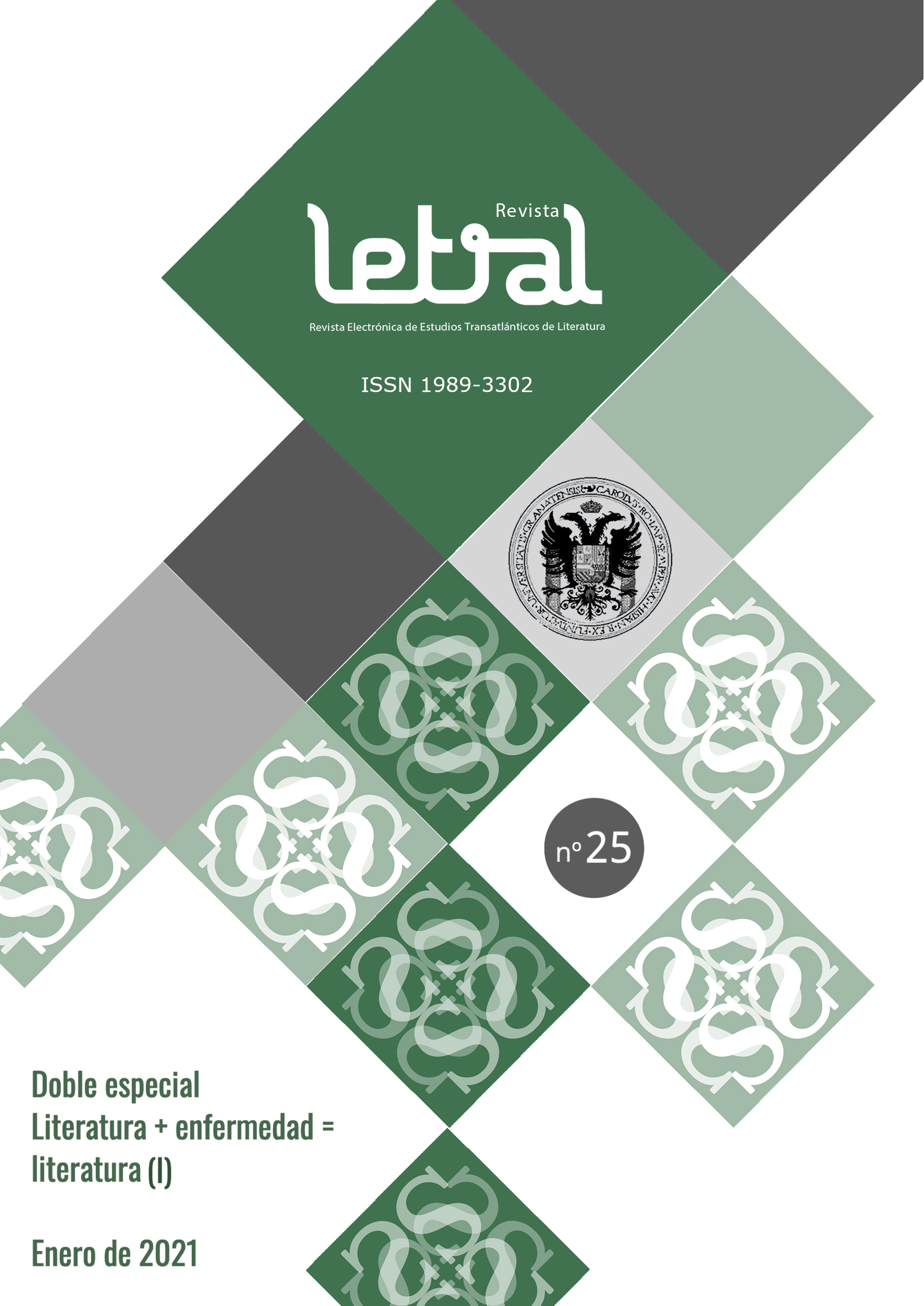Opening the Wounds. Meruane, Gerber, Mendieta: Geo-Writings of a Damaged Planet
DOI:
https://doi.org/10.30827/rl.v0i25.16744Keywords:
extractivism, female bodies, landscape, geologic writingAbstract
Drawing on the conceptualizations of the in-mundo (Andermann) and the cosmo-agony (Galindo), this article explores a series of literary and artistic expressions that connect the pathological imaginary of the human body with the ecological crisis. It deals with the strategies of codification of illness that are displayed in texts by Verónica Gerber and Lina Meruane, and that are also echoed in recent artistic production in Latin America. Placed in the specific context of the productive areas of the extractivist system, I suggest that the works analyzed here use illness as a metaphor for environmental degradation by establishing a parallel between body – territory – text.
Downloads
References
Agamben, Giorgio. Homo sacer. El poder soberano y la nuda vida. Madrid: Pre-Textos, 1998.
Andermann, Jens. “Despaisamiento, inmundo, comunidades emergentes”. Corpus, vol. 8, n.º 2, 2018. En línea: http://journals.openedition.org/corpusarchivos/2701
Cárdenas, Juan. El diablo de las provincias. Cáceres, Periférica, 2017.
Danowski, Déborah; Viveiros do Castro, Eduardo. ¿Hay un mundo por venir? Ensayo sobre los miedos y los fines. Buenos Aires, Caja negra, 2019 [2014].
Esposito, Roberto. Immunitas: protección y negación de la vida. Buenos Aires, Amorrortu, 2005.
Foucault, Michel. Seguridad, territorio, población. Buenos Aires, Fondo de Cultura Económica, 2006.
Foucault, Michel. Nacimiento de la biopolítica. Buenos Aires, Fondo de Cultura Económica, 2007.
Galindo, María. “Recibir una epifanía para enfrentar una agonía: respuesta de María Galindo a los textos pandémicos de Paul Preciado”. La Vaca. En línea: https://www.lavaca.org/notas/recibir-una-epifania-para-enfrentar-una-agonia-respuesta-de-maria-galindo-a-los-textos-pandemicos-de-paul-preciado/. Visitado el 30 de octubre de 2020.
Gerber, Verónica. La compañía. México, Almadía, 2019.
Gómez-Barris, Macarena. The Extractive Zone. Social Ecologies and Decolonial Perspectives. Durham, Duke University Press, 2017.
Haraway, Donna. Staying With the Trouble. Making Kin in the Chthulucene. Durham, NC, Duke University Press, 2016.
Heffes, Gisela. “Las crónicas del mundo que viene. Cambio climático, extinción y literatura”. Revista Anfibia. En línea: http://revistaanfibia.com/ensayo/las-cronicas-del-mundo-viene/
Keizman, Betina. “Las dinámicas de lo viviente: repetición, supervivencia y vidas potenciales”. 452º F, 17, 2017, pp. 102-121.
Keizman, Betina. “Territorios y naturaleza bajo la transmutación del archivo”. Valenciana, 24, 2019, pp. 229-246.
Kopenawa, Davi; Albert, Bruce. A queda do céu. Palavras de um chama yanomami. Sao Paulo, Companhia das Letras, 2015.
Meruane, Lina. Fruta podrida. Buenos Aires, Eterna Cadencia, 2015.
Preciado, Paul “Aprendiendo del virus”. El País, 2020. En línea: https://elpais.com/elpais/2020/03/27/opinion/1585316952_ 026489.html
Quammen, David. Spillover: Animal Infections and the nex human pandemic. New York, W.W. Norton, 2012.
Rivera Garza, Cristina. Los muertos indóciles. Necroescrituras y desapropiación. México, Tusquets, 2013.
Rivera Garza, Cristina. “Fincar sobre tierra firme. La escritura geológica de Gerardo Arana”. Literal Magazine. En línea: https://literalmagazine.com/fincar-sobre-tierra-firme-la-escritura-geologica-de-gerardo-arana/. Visitado 30/10/2020
Schweblin, Samanta. Distancia de rescate. Madrid, Random House, 2015.
Sontag, Susan. La enfermedad y sus metáforas [orig. 1978]; El sida y sus metáforas [1988]. Buenos Aires, Taurus, 2003.
The New Museum of Contemporary Art. Ana Mendieta, A retrospective (curaduría de Petra Barreras del Río y John Perreault). New York, 1987.
Published
How to Cite
Issue
Section
License
Revista Letral is an open access journal under a Creative Commons Atribución-NoComercial 4.0 license.
The works published in this journal may be reused, distributed and publicly presented for non-commercial purposes, provided that: cite the authorship and the original source of the publication (journal, publisher and URL of the work).
We strongly recommended you to share our published articles in social and scientific networks, institutional and public repositories, personal or institutional websites, blogs, Google Scholar, ORCID, ResearchID, ScopusID, etc.
The journal allow the author(s) to hold the copyright and to retain publishing rights without restrictions.
We are completely free, both for readers and authors.














